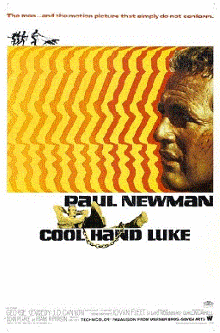
Paul Newman is one of Hollywood’s legendary actors but I don’t believe I’ve ever watched any significant film that he has been in until now. Cool Hand Luke turned out to be an excellent choice and I liked it so much that I immediately went to check if director Stuart Rosenberg, who I have never heard of before this, was another underappreciated director with a rich filmography to mine. Unfortunately while his body of work is indeed respectable this seems to be his best film.
Luke Jackson is a decorated veteran of the Second World War who is arrested for cutting the heads of parking meters while drunk. He is sent to a small prison in Florida which regularly sends the inmates out to work as a part of a chain-gang. As you might expect in a prison film, he butts heads with the prisoners’ leader Dragline and they have it out in a boxing match sanctioned by the guards. Dragline easily beats the stuffing out of Luke but the latter wins respect by stubbornly refusing to give up. His reputation is further cemented when in a card game he repeatedly raises the ante and doesn’t quit, eventually causing the others to fold even though he has no good cards at all. For this stunt, he earns the nickname Cool Hand Luke and becomes known for his indomitable spirit and his sassy attitude towards the prison authorities. One day he receives news that his mother has passed away and the experienced warden locks him up in solitary confinement as a precautionary measure. Rather than break his spirit however, the punishment only seems to inspire him.
On one level, Cool Hand Luke seems like a straightforward, rather pleasant film about a man who deliberately puts himself in prison and doesn’t have an altogether bad time in it. He makes friends, finds ways to amuse himself and seems to have the grudging respect of even the guards. Yet around the seemingly simple story is wrapped an astonishingly rich tapestry of themes which serves to elevate it to the status of a classic. The oft cited one is that Luke is a Christ-like figure who endures oppression, hardship and eventually physical abuse without being broken. This is directly alluded to in the film’s imagery and you could think of his monologue in the church as a son asking his father what his purpose on Earth is. Another way to look at it is to remember that it was made during the Vietnam War and Luke is a veteran soldier. Seen in that light, it’s an anti-establishment film depicting one man’s protest against the powers-that-be and their arbitrary decisions without having to be accountable to the common people.
My own favorite view of it is rooted in his sobriquet of Cool Hand Luke itself, by which Dragline means someone who is defiant and cool in the face of oppression despite not having anything with which to back up his attitude and that is something to be admired. To me, this brings to mind the starkly contrasting philosophies of the East exemplified in Chinese and Japanese proverbs such as the mantis who attempts to block the cart or the nail that stands out. In these cases, such attitude is seen as unfounded arrogance and it is the duty of society to beat that defiance out of the individual. Here it is the individual who is celebrated as a legend and even if his only victory is the symbolic breaking of a prison guard’s sunglasses that is enough. What’s more is that each of these themes complement and reinforce one another, making the film as a whole so much greater and richer for it.
The excellence of the film’s more conventional production values is worth noting as well. For example there is a relatively large number of other characters in the form of the guards and the other prisoners and it’s quite impressive how they are all distinct and rather memorable despite their minor roles. Having seen George Kennedy, in a large number of other roles, most obviously in the Naked Gun series for example, it is astounding to realize how good an actor he is playing Dragline here. These are just a few of very many reasons why Cool Hand Luke is a great watch that I am very glad I didn’t miss out on.
2 thoughts on “Cool Hand Luke (1967)”